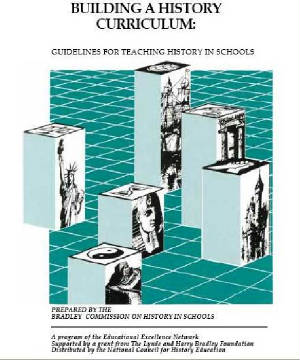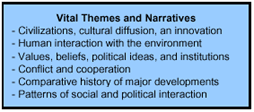|
|
 |
Chapter 4 of this PBS documentary (Chapter 4 is called Lincoln, slavery and racial equality), Professor Gates interviews both David Blight and Lerone Bennett, Jr. Both historians have decidedly different takes
on Abraham Lincoln. Their differing opinions highlight the difficulties and opportunities we face as social studies
teachers. Bennett believes that by focusing on Lincoln we ignore "the greatest generation of white people ever produced
in this country"; those who fought to end slavery. While these people were active, Lincoln was silent, Bennett
insists.
David Blight said, "in order to remember the redemptive progressive Lincoln we have
to forget what he said in the Lincoln-Douglas debates." Blight added "remembering is always about some degree of forgetting."
Do we, as teachers of thinking, ever think of history as a process of choosing what we remember or what
we forget?
|
 |
|

Background on the Bradley Commission
The Bradley Commission on History in Schools was formed in 1987 in response
to concerns regarding the quality and quantity of the history taught in American classrooms. The group was comprised of 16
of the most respected members of the history profession, including former presidents of each of the major professional organizations
in history and a number of award-winning history teachers and writers. It was chaired by Kenneth T. Jackson, who went on,
along with 189 concerned historians and educators, to form the National Council for History Education (NCHE) in 1990. The
Commission's work was funded by the Lynde and Harry Bradley Foundation.
All of the above information was taken from the following
source: "About Bradley Commission on History in Schools." Designed Instruction. 9 Mar. 2008
<http://www.designedinstruction.com/reports/about_bradley_commission.html>.
|
 |
|
|
 |
|
|
 |
|
|
|
|

|
| (After Naturalization Cermony at Disney World) |
The VITAL Message of the Bradley Commission
Teaching U.S. History is VITAL to creating a unified country. According to Kenneth Jackson,
"Unlike many other peoples, Americans are not bound together by a common
religion or a common ethnicty. Instead, our binding heritage is a democratic vision of
liberty, equality, and justice.
If Americans are to preserve that vision and bring
it to daily practice, it is imperative that all
citizens
understand how it was shaped in the past."

Other important conclusions made by the report:
It [the report] sets forth a consensus of perspectives and ways of "historical
thinking" that far transcend specific and useful facts. As the Commission words it: "'What of it?' is a worthy question and
it requires an answer." To nurture these habits of mind, the Commission established a core set of Vital Themes and Narratives
(see image).
To read the entire Bradley Commission report, follow this link to the
National Council for History Education (NCHE).
|
|
|
 |

